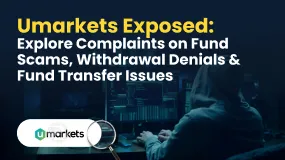WikiFX report: Crypto exchange Luno facilitates record R121bn transactions
Abstract:Global crypto-currency exchange Luno added almost a million new South African customers during 2020, and over 250 000 so far in 2021.

Global crypto-currency exchange Luno added almost a million new South African customers during 2020, and over 250 000 so far in 2021.
The company made the announcement this morning, as the price of Bitcoin, the worlds most popular crypto-currency, hit a record high of $62 500 (R910 000).
According to Luno, the crypto exchange has achieved 300% year-on-year growth compared to January 2020, and recorded $8.3 billion (R121 billion) in transactions worldwide.
Luno processed nearly $3 billion (R43 billion) in volumes in SA last year, and was already above this number at the end of March.
An estimated 15% of South Africans have invested in Bitcoin – the second highest percentage in the world, according to the Global Web Index, beating even the US and Japan, says Luno.
It adds that with over 2.1 million users in SA, Luno has around the same number of clients as South African Twitter users, according to Statistica. It‘s also the fifth most popular finance app on iPhone and third on Android – ahead of most of Africa’s biggest banks, says the exchange.
It points out that a three-month average reveals more than 145 000 South Africans installed the Luno app each month from November 2020 to January 2021.
The average Luno user held over $7 000 in their wallet on 25 January 2021, up 56% from 30 December 2020, the company notes.
Marcus Swanepoel, CEO and co-founder of Luno, comments: The past 12 months hastened the adoption of crypto globally.
“While a lot of the attention has been around institutional adoption, retail adoption has been growing at an arguably even more frantic pace. In 2021, we expect to continue this exponential growth, on track to reaching our goal of one billion customers by 2030.”
According to Marius Reitz, Luno GM for Africa: “South Africans are definitely curious about crypto. Google Trends has South Africa as among the highest in the world for interest in #Bitcoin – fourth behind Nigeria, Austria and Switzerland. Searches for #Bitcoin peaked in the first week of January this year,” says Reitz.
Interestingly, says Luno, crypto investors in SA are relatively young. Around 40% of Luno‘s South African customers are aged 29 or under, says the company, adding that around 65% of Luno’s users are male and about 35% female, which is better than the industry average of 70% male to 30% female.
Since Luno‘s acquisition in September 2020 by Digital Currency Group (DCG), the world’s largest blockchain investor, the crypto-currency exchange has seen the number of active users increase by 167%, while the number of app installs has increased 119%.
CEO Barry Silbert from DCG says: Luno has seen phenomenal growth over the past 12 months and is one of the fastest-growing companies in DCG. We will continue to make significant investments to support Lunos commitment to drive global economic and social change through the transformation of traditional financial services.
“While regulation generally tends to lag behind innovation, regulators in South Africa have shown a great willingness to engage with the community and work towards pragmatic regulation.”
Luno was founded in 2013 by two South Africans, Marcus Swanepoel, a former investment banker, and Timothy Stranex, who previously worked for Google as a software engineer.
Read more

umarkets Exposed: Explore Complaints on Fund Scams, Withdrawal Denials & Fund Transfer Issues
Does umarkets ask you to pay an additional fee for withdrawal access? Is your trading experience with umarkets full of losses?Struggling to transfer funds from your forex trading account? Have you had to face manipulated fees and reduced payouts? Does the customer support team fail to address your trading queries? These trading issues have become increasingly common for traders here. In this umarkets review article, we have shared multiple complaints against the broker. Take a look!

Is Capital.com Regulated? Full License Overview
Capital.com is regulated by ASIC, FCA, CYSEC, UAE SCA Bahamas SCB. Explore its licenses and broker trustworthiness.

Spread Co Regulation and FCA License Details Explained
Spread Co is FCA regulated under license 446677 as a Market Maker in the UK, offering spread betting and CFD accounts.

Robinhood Expands into Indonesia with Buana Capital Acquisition
Robinhood accelerates its expansion into Southeast Asia with the acquisition of Buana Capital, paving the way for Robinhood crypto trading in Indonesia.
WikiFX Broker
Latest News
Is Tauro Markets Safe? A 2025 Deep Look into Its Risks and Openness
QuickTrade Review: Multiple Reports of Account Freezes and Login Failures by Users
The TikTok Scam That Cost a Retiree Nearly RM470,000
The "Arbitrage" Accusation: How Winning Trades Turn Into Account Reviews at ACY Securities
IC Markets Formula 1 Partnership Debuts at Abu Dhabi GP 2025
Tag Markets Exposed: Withdrawal Issues, Inflated Spreads & Market Manipulation Concerns
Inside the BSN Scandal: Bank Officer Stole Over RM11 Million from Victims
Trading Knowledge is Wealth! Take the Daily Quiz Challenge and Win 1,000 Points!
Is Capital.com Regulated? Full License Overview
umarkets Exposed: Explore Complaints on Fund Scams, Withdrawal Denials & Fund Transfer Issues
Rate Calc


